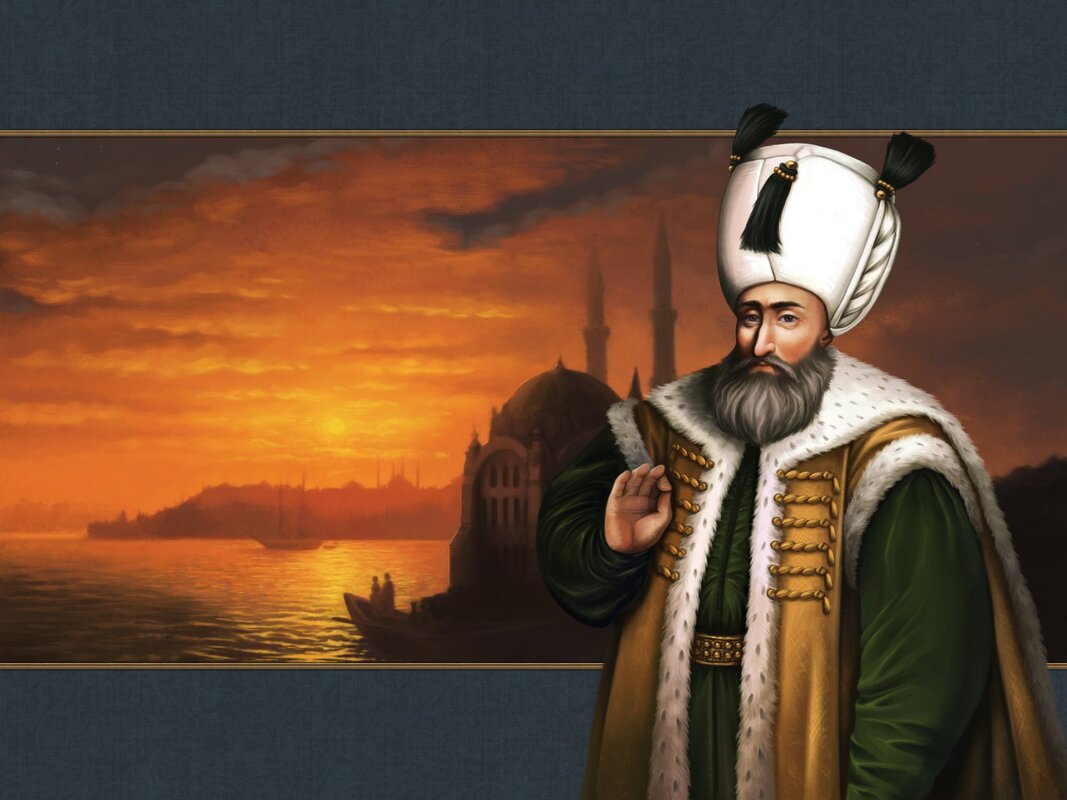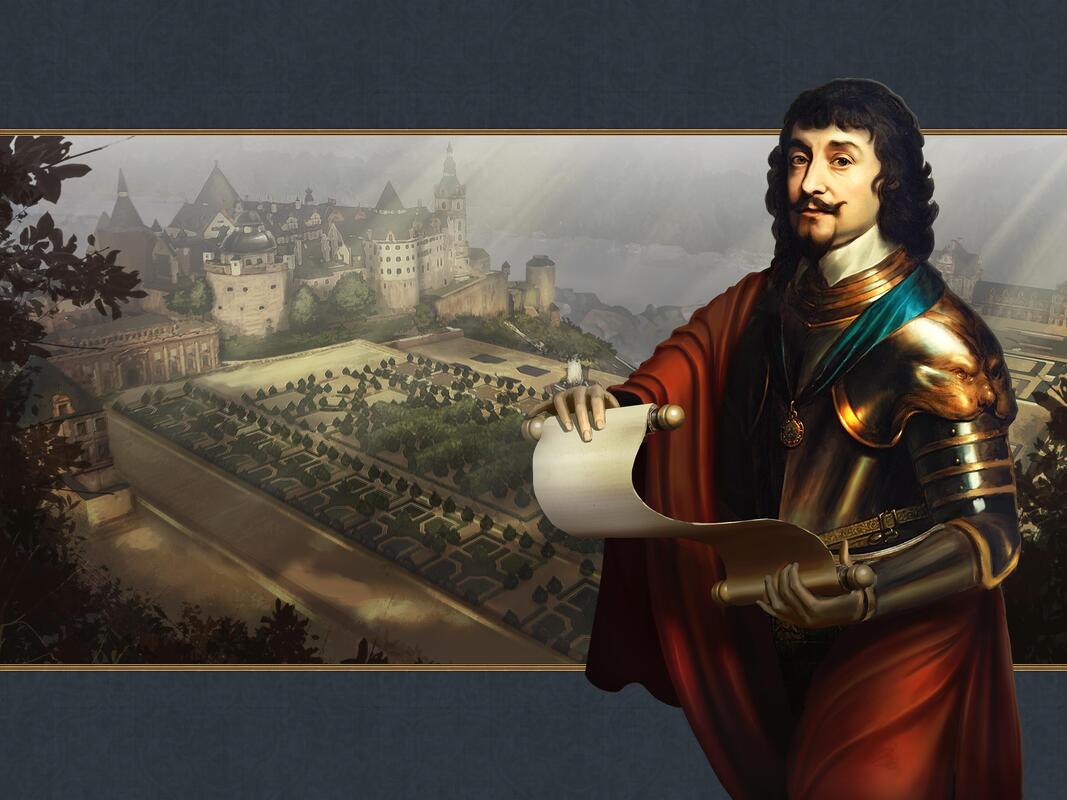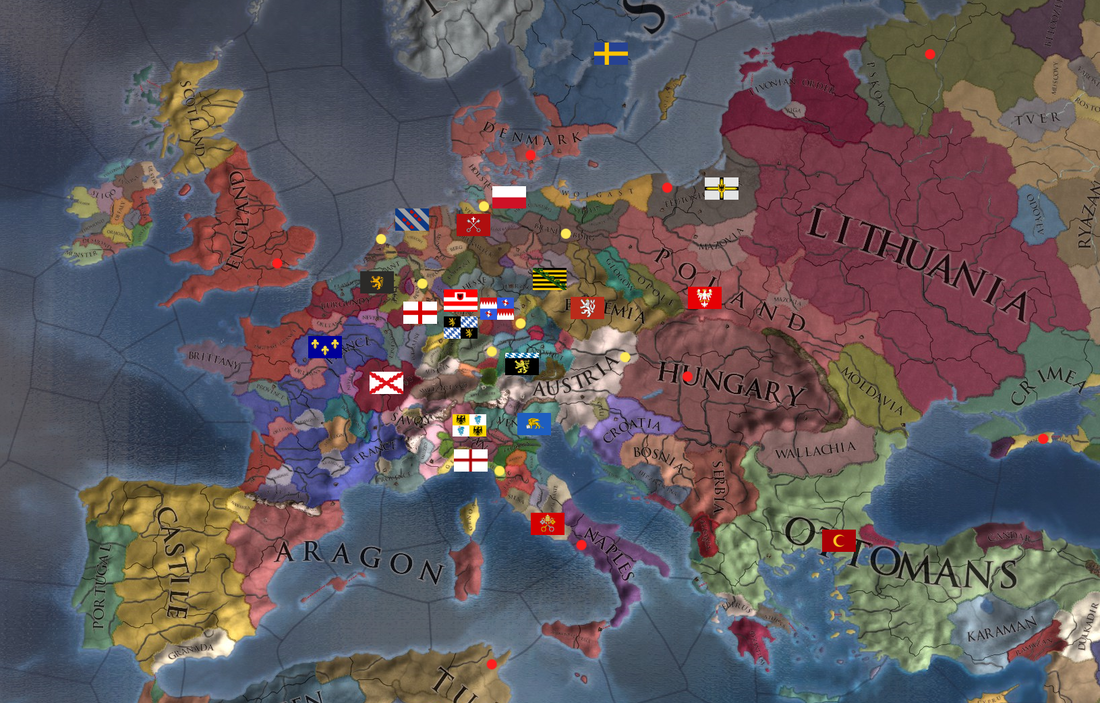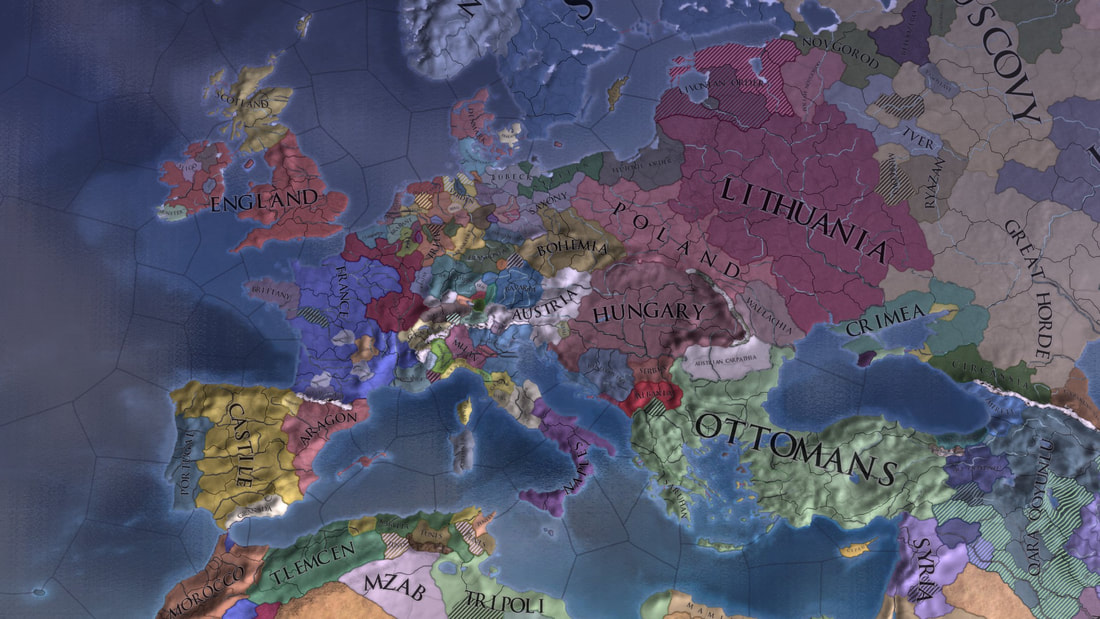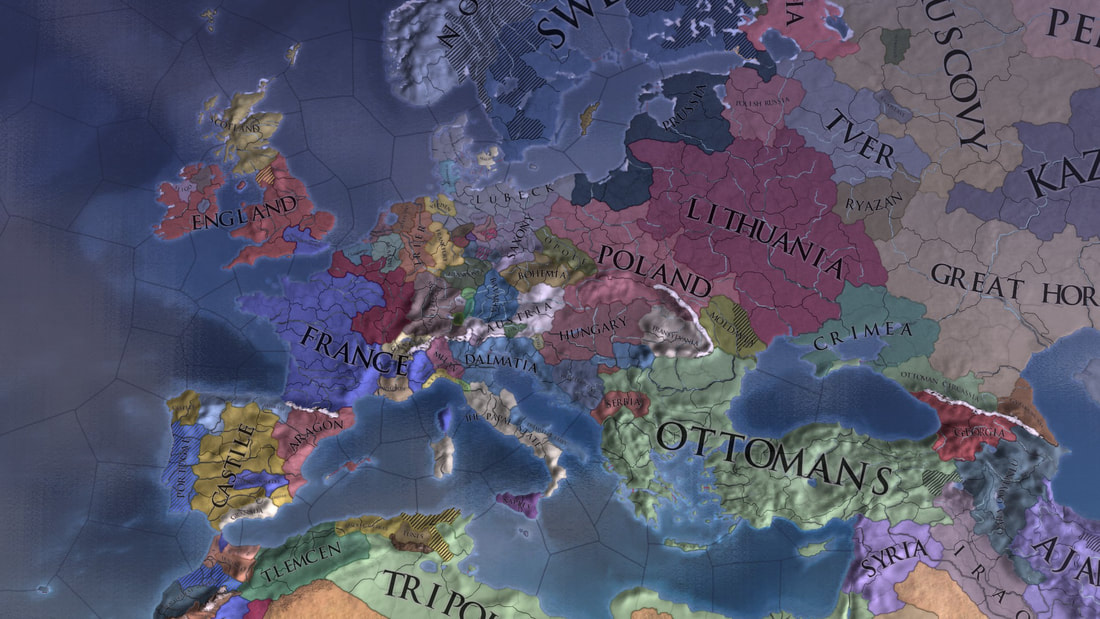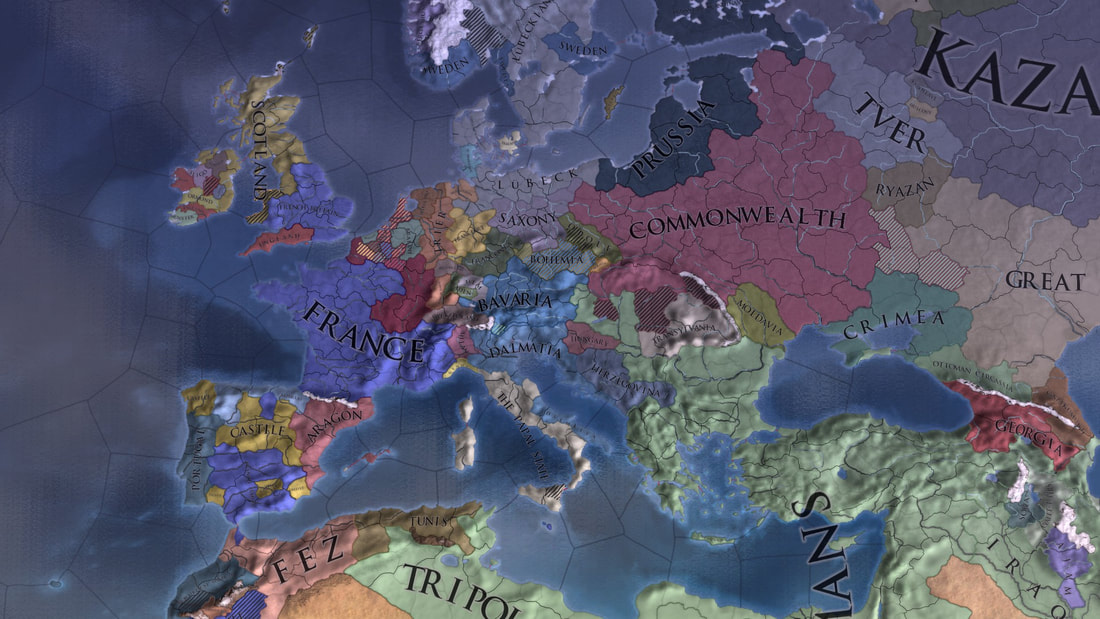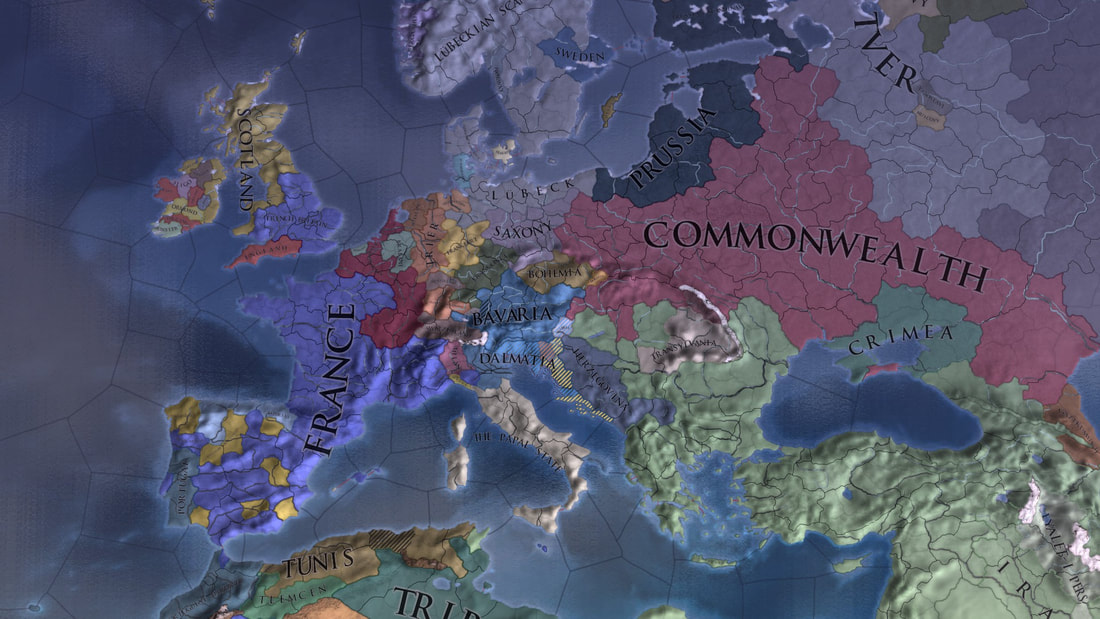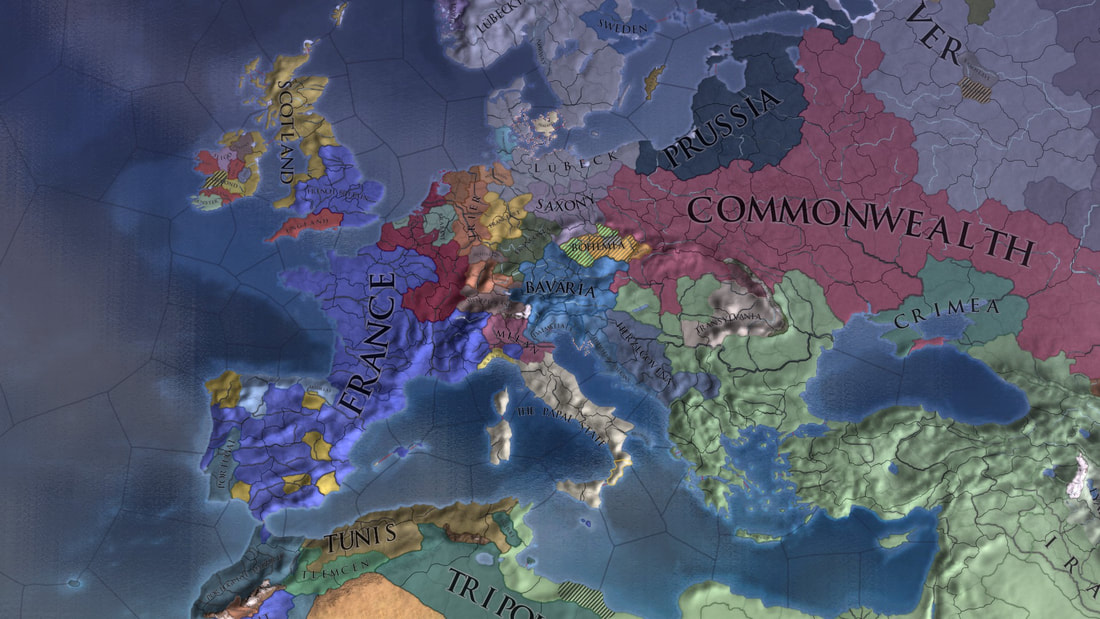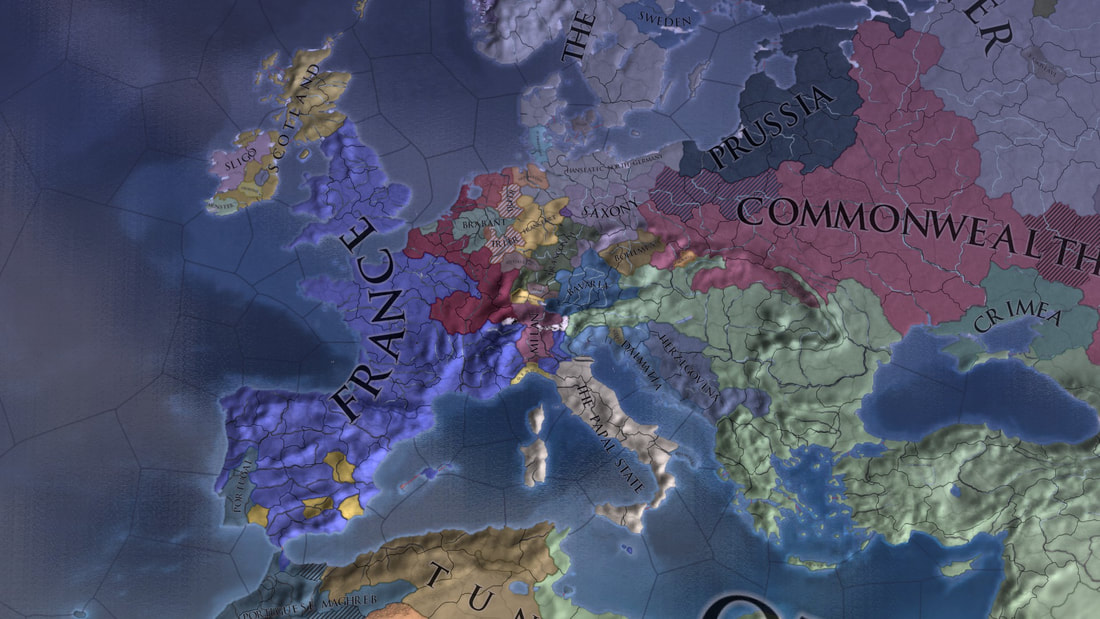|
Start date: 21 Aug 2023
Game Time: 19:00 CEST - 22:00 CEST |
Discord invite: https://discord.gg/BFKVVKCr
Speed 5 Twitch channel: http://www.twitch.tv/speed5official |
Imperial Ambitions
Speed 5 Campaign
Scoring Rules and rewards
In-game points will be ignored for this campaign. Instead, players may accumulate points as described below.
Bishops
- 100 points for holding the Curia unless the player is the Papacy.
- 30 points for each alliance with an Elector, the Holy Roman Emperor, or the Catholic Defender of the Faith, as long as that nation is not also a member of the Bishop group.
- 20 x (DotF Rank) points for holding a Defender of the Faith title.
- 10 points for each Conqueror Objective or Imperial Objective province that is Catholic (cooperative objective).
- 100 points if 0 Conqueror Objectives are held by members of the HRE or the Emperor, 0 Objectives are held by trade league members and at least 5 objectives are Catholic (cooperative objective).
Princes
- X points for each Imperial Objective owned, where X is equal to Imperial Legitimacy.
- X points for holding the position of Holy Roman Emperor where X is equal to Imperial Legitimacy.
- 20 x (DotF Rank) points for holding a Defender of the Faith title.
- 50 points for each Conqueror Objective that is owned by a member of the Empire or the Holy Roman Emperor (cooperative objective).
- 100 points if less than 5 objectives are Catholic, 0 Objectives are held by trade league members, and at least 1 Conqueor Objective is held by a member of the HRE or the Emperor (cooperative objective).
Magnates
- 30 points each for holding at least 10% trade power in the Wien, Saxony, Rhineland, or Champagne trade nodes. This is increased to 100 points if the nation is the strongest trade power in the node.
- 50 points for holding the trade leader bonus for any trade good. This is increased to 100 points if holding more than one trade leader bonus.
- 20 x (DotF Rank) points for holding a Defender of the Faith title.
- 20 points for each Conqueror or Imperial Objective that is held by a trade league member (not the trade league leader) (cooperative objective).
- 100 points if less than 5 Objectives are Catholic, 0 Conqueror Objectives are held by members of the HRE or the Emperor, and at least 1 Objective is held by a trade league member (cooperative objective).
Despots
- 100 points for owning at least one of the objectives from a Conqueror Objective pair. Owning both objectives in a pair does not provide additional points, but if another Despot owns the other Conqueror Objective from that pair, the value of both objectives becomes 0 pts for Despots as long as two separate despots each own one objective of the pair.
- 100 points for owning at least one Imperial Objective. Owning further Imperial Objectives will not yield any further points, but if two or more different Despots own any Imperial Objectives, all Imperial Objectives are worth 0 points for Despots as long as this is true.
- X points for holding the position of Holy Roman Emperor where X is equal to Imperial Legitimacy.
- 10 points for each Imperial province owned if the player is not the Emperor or a member of the HRE, up to a maximum of 100. These provinces must be owned directly and not through subjects.
- 20 x (DotF Rank) points for holding a Defender of the Faith title.
- 100 points if less than 5 objectives are Catholic, 0 Conqueror Objectives are held by members of the HRE or the Emperor, and 0 Objectives are held by a trade league member (cooperative objective).
Imperial Legitimacy = (Total number of nations in the HRE) x 2
Advice: The Princes, and any Despot who is Emperor, is reliant on the health of the Empire for score. If the HRE has devolved into a meaningless title, these objectives will lose much of their value, but if the HRE is strengthened and expanded, the value will increase.
Ages and Scoring - This campaign will score at the death of each Holy Roman Emperor (there is no score at if the emperor is forced to change by events such as full annexation or change of religion). A save of the game will be taken at the event of new Holy Roman Emperor, and this will provide a snapshot of all player's game objectives. All scores are multiplied by the number of the Age, meaning objectives become much more valuable over time. Score can also be gained in some ways that are immediate and any immediate score will generally be multiplied by the number of the Age it takes place during (Discovery - x1, Reformation - x2, Absolutism - x3, Revolution - x4). There will be one additional scoring on the end of the campaign. Note that this campaign will not include the 4th Age and will end as soon as the 3rd Age ends.
Advice: Generally it is more reliable to obtain objectives as early as possible and defend them, rather than hope to take them later. On the other hand, securing objectives early and aggressively can set the field against you in the campaign's early diplomacy. Waiting until the late game to make decisive moves can pay off, as the Age multiplier can quickly catapult a player into the lead as long as previous leaders are deprived of their own sources of score.
Group Objectives - Scoring objectives differ depending on the nation's group and some groups may have objectives that are cooperative and contribute points to all players score in that scoring group. Some objectives for this campaign will be modified by a value referred to as Imperial Legitimacy, which is described below:
Advice: Except for the Despots, all scoring groups have a cooperative objective that can gain points for all members of the group. Beyond that, the members of your scoring group will likely be rivals for your specific objectives and you may find it easier to find common goals with members of other scoring groups. Note that some groups, such as the Bishops goal for objective provinces to be Catholic, will start the game with some objectives already held and can expect to have an advantage from the start of the game, unless others interfere.
Overlords and Subjects - Objectives count as owned by a nation if that nation owns it or if one of their AI subjects own it (the AI subject does not count as owning the objective unless otherwise specified). Any player that is a subject (including a tributary) must give half the value of any objectives owned to his overlord. If the overlord is an AI, then these points are simply lost. If the subject has a Liberty Desire of 50% or above, they will instead keep a percentage of their score equal to their Liberty Desire.
Advice: Playing as a subject is viable and may often be necessary for a player to remain competitive. Overlords are incentivized to ensure any players they have as subjects gain as much score as possible, but other players should make every effort to ensure these subjects are able to achieve high liberty desire or regain independence.
Bishops
- 100 points for holding the Curia unless the player is the Papacy.
- 30 points for each alliance with an Elector, the Holy Roman Emperor, or the Catholic Defender of the Faith, as long as that nation is not also a member of the Bishop group.
- 20 x (DotF Rank) points for holding a Defender of the Faith title.
- 10 points for each Conqueror Objective or Imperial Objective province that is Catholic (cooperative objective).
- 100 points if 0 Conqueror Objectives are held by members of the HRE or the Emperor, 0 Objectives are held by trade league members and at least 5 objectives are Catholic (cooperative objective).
Princes
- X points for each Imperial Objective owned, where X is equal to Imperial Legitimacy.
- X points for holding the position of Holy Roman Emperor where X is equal to Imperial Legitimacy.
- 20 x (DotF Rank) points for holding a Defender of the Faith title.
- 50 points for each Conqueror Objective that is owned by a member of the Empire or the Holy Roman Emperor (cooperative objective).
- 100 points if less than 5 objectives are Catholic, 0 Objectives are held by trade league members, and at least 1 Conqueor Objective is held by a member of the HRE or the Emperor (cooperative objective).
Magnates
- 30 points each for holding at least 10% trade power in the Wien, Saxony, Rhineland, or Champagne trade nodes. This is increased to 100 points if the nation is the strongest trade power in the node.
- 50 points for holding the trade leader bonus for any trade good. This is increased to 100 points if holding more than one trade leader bonus.
- 20 x (DotF Rank) points for holding a Defender of the Faith title.
- 20 points for each Conqueror or Imperial Objective that is held by a trade league member (not the trade league leader) (cooperative objective).
- 100 points if less than 5 Objectives are Catholic, 0 Conqueror Objectives are held by members of the HRE or the Emperor, and at least 1 Objective is held by a trade league member (cooperative objective).
Despots
- 100 points for owning at least one of the objectives from a Conqueror Objective pair. Owning both objectives in a pair does not provide additional points, but if another Despot owns the other Conqueror Objective from that pair, the value of both objectives becomes 0 pts for Despots as long as two separate despots each own one objective of the pair.
- 100 points for owning at least one Imperial Objective. Owning further Imperial Objectives will not yield any further points, but if two or more different Despots own any Imperial Objectives, all Imperial Objectives are worth 0 points for Despots as long as this is true.
- X points for holding the position of Holy Roman Emperor where X is equal to Imperial Legitimacy.
- 10 points for each Imperial province owned if the player is not the Emperor or a member of the HRE, up to a maximum of 100. These provinces must be owned directly and not through subjects.
- 20 x (DotF Rank) points for holding a Defender of the Faith title.
- 100 points if less than 5 objectives are Catholic, 0 Conqueror Objectives are held by members of the HRE or the Emperor, and 0 Objectives are held by a trade league member (cooperative objective).
Imperial Legitimacy = (Total number of nations in the HRE) x 2
Advice: The Princes, and any Despot who is Emperor, is reliant on the health of the Empire for score. If the HRE has devolved into a meaningless title, these objectives will lose much of their value, but if the HRE is strengthened and expanded, the value will increase.
Ages and Scoring - This campaign will score at the death of each Holy Roman Emperor (there is no score at if the emperor is forced to change by events such as full annexation or change of religion). A save of the game will be taken at the event of new Holy Roman Emperor, and this will provide a snapshot of all player's game objectives. All scores are multiplied by the number of the Age, meaning objectives become much more valuable over time. Score can also be gained in some ways that are immediate and any immediate score will generally be multiplied by the number of the Age it takes place during (Discovery - x1, Reformation - x2, Absolutism - x3, Revolution - x4). There will be one additional scoring on the end of the campaign. Note that this campaign will not include the 4th Age and will end as soon as the 3rd Age ends.
Advice: Generally it is more reliable to obtain objectives as early as possible and defend them, rather than hope to take them later. On the other hand, securing objectives early and aggressively can set the field against you in the campaign's early diplomacy. Waiting until the late game to make decisive moves can pay off, as the Age multiplier can quickly catapult a player into the lead as long as previous leaders are deprived of their own sources of score.
Group Objectives - Scoring objectives differ depending on the nation's group and some groups may have objectives that are cooperative and contribute points to all players score in that scoring group. Some objectives for this campaign will be modified by a value referred to as Imperial Legitimacy, which is described below:
Advice: Except for the Despots, all scoring groups have a cooperative objective that can gain points for all members of the group. Beyond that, the members of your scoring group will likely be rivals for your specific objectives and you may find it easier to find common goals with members of other scoring groups. Note that some groups, such as the Bishops goal for objective provinces to be Catholic, will start the game with some objectives already held and can expect to have an advantage from the start of the game, unless others interfere.
Overlords and Subjects - Objectives count as owned by a nation if that nation owns it or if one of their AI subjects own it (the AI subject does not count as owning the objective unless otherwise specified). Any player that is a subject (including a tributary) must give half the value of any objectives owned to his overlord. If the overlord is an AI, then these points are simply lost. If the subject has a Liberty Desire of 50% or above, they will instead keep a percentage of their score equal to their Liberty Desire.
Advice: Playing as a subject is viable and may often be necessary for a player to remain competitive. Overlords are incentivized to ensure any players they have as subjects gain as much score as possible, but other players should make every effort to ensure these subjects are able to achieve high liberty desire or regain independence.
Other Campaign Rules
1. The Treaty Rules - Specific rules to force the acceptance of treaties to encourage riskier, faster, localized wars and prevent endless wars. The game may be paused to enforce these treaty rules.
The 30% Rule - At any point in a war that the primary aggressor/defender has 30% or more war-score, they may send a peace treaty demanding a white peace or the annexation of one province that they occupy, that is owned by the primary defender/aggressor, and that they share a border with by land or sea, and this peace treaty cannot be refused. To be unrefusable, the treaty must contain no other conditions except a white peace or the annexation of the single province and the province must not be a nation's capital or part of their capital Area. The sending player may pause the game for this treaty, so that the war-score will not change and the rule can be enforced. For this rule, provinces owned or occupied by non-tributary subjects count as being owned or occupied by their overlord.
The 95% Rule - At any point in a war that the primary aggressor/defender has 95% or more war-score, they may send any peace treaty with annexation of up to 100% warscore of occupied provinces, and this peace treaty cannot be refused. The treaty must contain no other conditions except the annexation of occupied provinces and the provinces must not be a nation's capital or part of their capital Area. The sending player may pause the game for this treaty, so that the war-score will not change and the rule can be enforced.
3. Home Area Protection - Protection rules to maintain a minimal power base of every player.
Players are not allowed to purposefully annex any province owned by a player in that player's starting capital Area. Because this can be easy to violate accidentally during quick treaty negotiations, the mod will automatically return any provinces in a player's protected area back to the player if annexed by another player.
4. Endless Player Restart - Further protection rules to prevent player elimination.
If a player is eliminated by the AI, his starting capital, and all provinces in his capital's area that still have cores of his nation, will be released at the start of the next session as a vassal of the nation that now owns his starting capital province.
5. One-Time Absence Protection - Further protection rules to prevent elimination by absence.
Before a game session, a player may invoke protection for their nation one time. Other players may not attack a protected nation, and may not demand any peace terms from their nation if they find themselves at war by other means. Otherwise absent players' nations are not protected in missed sessions and players cannot take advantage of protection after the year 1750 regardless. If a war continues into a player's protected session, his enemies may not demand the ceding/release of land they did not occupy at the start of the protected session, or release nations that do not entirely exist within land they occupied at the start of the protected session, but other treaty terms that have no direct effect on province ownership are allowed in this situation. This protection is ignored in any wars initiated by the protected nation that target another player, so players are responsible for ensuring their nation is passive during their absence in their AI settings. Please inform one of the game hosts anytime before the start of a session if you will be absent and would like to use your protection. Protection may be used if arriving late but not for departing early from a session.
6. Switching to a new Nation by in-game decision - Use of the vassal or colony release buttons
A player may use the vassal release mechanic or colonial nation release mechanic to switch to playing another nation. Protected Areas in the campaign will not be changed, and in the event of player elimination, the player may only return to control his original nation or be reinstated as his original nation according to rule 3. Players may switch nations via any in-game decision available, but their Protected Area will never change.
7. Discord War Channels - Public channels for private coordination
Please do not enter occupied War Channels unless invited by an occupant. These channels are available for both plotting in peacetime and coordination during wartime. Refusing to respect War Camp privacy will lead to being kicked from the Discord and/or game.
The 30% Rule - At any point in a war that the primary aggressor/defender has 30% or more war-score, they may send a peace treaty demanding a white peace or the annexation of one province that they occupy, that is owned by the primary defender/aggressor, and that they share a border with by land or sea, and this peace treaty cannot be refused. To be unrefusable, the treaty must contain no other conditions except a white peace or the annexation of the single province and the province must not be a nation's capital or part of their capital Area. The sending player may pause the game for this treaty, so that the war-score will not change and the rule can be enforced. For this rule, provinces owned or occupied by non-tributary subjects count as being owned or occupied by their overlord.
The 95% Rule - At any point in a war that the primary aggressor/defender has 95% or more war-score, they may send any peace treaty with annexation of up to 100% warscore of occupied provinces, and this peace treaty cannot be refused. The treaty must contain no other conditions except the annexation of occupied provinces and the provinces must not be a nation's capital or part of their capital Area. The sending player may pause the game for this treaty, so that the war-score will not change and the rule can be enforced.
3. Home Area Protection - Protection rules to maintain a minimal power base of every player.
Players are not allowed to purposefully annex any province owned by a player in that player's starting capital Area. Because this can be easy to violate accidentally during quick treaty negotiations, the mod will automatically return any provinces in a player's protected area back to the player if annexed by another player.
4. Endless Player Restart - Further protection rules to prevent player elimination.
If a player is eliminated by the AI, his starting capital, and all provinces in his capital's area that still have cores of his nation, will be released at the start of the next session as a vassal of the nation that now owns his starting capital province.
5. One-Time Absence Protection - Further protection rules to prevent elimination by absence.
Before a game session, a player may invoke protection for their nation one time. Other players may not attack a protected nation, and may not demand any peace terms from their nation if they find themselves at war by other means. Otherwise absent players' nations are not protected in missed sessions and players cannot take advantage of protection after the year 1750 regardless. If a war continues into a player's protected session, his enemies may not demand the ceding/release of land they did not occupy at the start of the protected session, or release nations that do not entirely exist within land they occupied at the start of the protected session, but other treaty terms that have no direct effect on province ownership are allowed in this situation. This protection is ignored in any wars initiated by the protected nation that target another player, so players are responsible for ensuring their nation is passive during their absence in their AI settings. Please inform one of the game hosts anytime before the start of a session if you will be absent and would like to use your protection. Protection may be used if arriving late but not for departing early from a session.
6. Switching to a new Nation by in-game decision - Use of the vassal or colony release buttons
A player may use the vassal release mechanic or colonial nation release mechanic to switch to playing another nation. Protected Areas in the campaign will not be changed, and in the event of player elimination, the player may only return to control his original nation or be reinstated as his original nation according to rule 3. Players may switch nations via any in-game decision available, but their Protected Area will never change.
7. Discord War Channels - Public channels for private coordination
Please do not enter occupied War Channels unless invited by an occupant. These channels are available for both plotting in peacetime and coordination during wartime. Refusing to respect War Camp privacy will lead to being kicked from the Discord and/or game.
GAmetactica Campaign Mod
Steamworks link:
https://steamcommunity.com/sharedfiles/filedetails/?id=3023656337
Effects of the campaign mod will be listed here:
Coring and Annexation changes:
- Doubled the base admin and diplo power cost of coring and diplomatically annexing provinces
Stability changes:
- Increase stability cost increased to 400 admin power
- Increased cost of Catholic "Beatify Local Saint" to 200 Papal Influence (max Papal Influence increased to 250)
- Each level of negative stability -1 legitimacy/ -1 Horde Unity / -1 Devotion (up to -3 total, no gain from positive stability)
- Each level of positive stability +0.05 heir claim strength (up to +0.15, no loss from negative stability)
- Each level of negative stability -.25 Republican tradition (scaling to -.75, no gain from positive stability)
- Each level of positive stability 5% cheaper re-election cost (up to 15%, no loss from negative stability)
- Increase Stability cannot be used while at war
Governing Capacity changes:
- Duchy Rank: -30% G.C. modifier;
- Kingdom rank: -15% G.C. modifier;
- Empire: Unchanged (0%)
- Malus of 100% increase to Development cost when at 200% of Governing Capacity (scaling from 100%)
- Malus of +0.4 Autonomy per month in provinces when at 200% of Governing Capacity (scaling from 100%)
State and Edict changes:
- 0.002 multiplier to state maintenance cost based on distance from capital (state maintenance increases significantly based on distance from capital)
- Edict state maintenance cost reduced by half
- Edict minimum time increased to 5 years
- Development cost reduction edict changed to Devastation reduction
- Absolution Age Devastation reduction edict changed to Prosperity Gain
Culture changes:
- Increase in cost to Promote a new Culture to 500 diplo power.
- x2 diplo cost to convert province culture
- Provinces with an unaccepted culture from different culture group province have +8 unrest and +0.04 local autonomy growth. (Republics retain slight mitigation from this as they do in base-game)
- Provinces with an unaccepted culture from the same culture group province have +2 unrest and +0.01 local autonomy growth.
Religion changes:
- Tolerance gives local autonomy -0.005 per level
- Intolerance gives local autonomy +0.005 per level
- Flat -5% religious conversion malus
Ruler and Heir strength changes:
- Abdication requires ruler to be age 60+
- Base heir claim strength set to +0.00
- 100% Religious Unity grants +0.10 heir claim strength (scaling)
Manpower changes:
- Soldiers Households reduced to 500 manpower
- Increased Levies manpower bonus reduced by 50%
War treaty changes:
- Maximum Aggressive Expansion increased to 200
- x4 allied war score modifier (cost of taking things from allied nations is much higher unless a cobelligerent)
- x3 allied aggressive expansion (cost of taking things from allied nations is much higher unless a cobelligerent)
- Annul Treaties Years increased to 20 (doubled)
- Dishonourable peace months increased to 36 (tripled)
Unrest and instability changes:
- Recent Uprising changed from -100 unrest to -5 unrest
- x2 to all maluses from Overextension
- x1.5 to all maluses from War Exhaustion
- Reduce War Exhaustion cannot be used during war
Diplomatic Relations changes:
- +75 mutual relations required for an alliance or to support independence
- Sabotage Reputation gives -30 opinion to all from the diplo action in addition to the base diplo reputation malus
- Offer to make vassal diplomatic action requires Guarantee dependency rather than an Alliance
- Good relations threshold = 30 (players are more likely to suffer stability/war exhaustion hits from attacking nations on good terms)
- Great relations threshold = 60 (players are more likely to suffer stability/war exhaustion hits from attacking nations on good terms)
- Minimum Relations to Support independence = 0
- Royal marriages create a 5 year truce
- Warning duration reduced to 10 years (halved)
- Support Rebels effect increased to 20 (doubled)
- Coalitions can be launched and joined by any human player against any other human controlled nation with only 15 Aggressive Expansion (AI required 50 AE).
- Reduced number of free Diplomatic Relations by 1
- Ottoman eyelets use 1 diplomatic relation
Great Power changes:
- Increased power projection flat bonuses per rank to +5/+10/+15/+20/+25/+30/+35/+40
- New 'Superiority Complex' malus (The longer a nation spends on the great power list, the more it will need to rely on relationships based on dominance instead of alliance due to the +75 relations alliance requirement)
Combat and army changes:
- Increased Terrain combat modifiers (Mountains, Highlands, Straits, Rivers, Swamps)
- 100 mil power base artillery barrage cost (naval barrage cost unchanged)
- x2 mil cost for forced march
- War taxes cost increased to 4 mil per month
- Mercenary maintenance increased by 20%
- Mercenary initial cost increased by further 20%
- Mercenary manpower pool decreased by 20%
- Cost to recruit Generals increased to 100 mil power
- Reduced number of free Generals by 1
- Cost to recruit Admirals increased to 100 dip power
- Reduced number of free Admirals by 1
- Maximum attrition cap increased from 5% to 10%
Protected Area:
- Players will immediately reclaim any province in the players starting Area that has one of their cores. (Feature to encourage player rebound and encourage diplomacy over elimination)
AI handicaps:
- -10% mil tech cost
- -20% stability cost modifier
- -30% promote culture cost
- +50% improve relations
Other:
- Holy Roman Empire cannot be dismantled by button.
- Human players cannot be inherited or diplomatically annexed.
https://steamcommunity.com/sharedfiles/filedetails/?id=3023656337
Effects of the campaign mod will be listed here:
Coring and Annexation changes:
- Doubled the base admin and diplo power cost of coring and diplomatically annexing provinces
Stability changes:
- Increase stability cost increased to 400 admin power
- Increased cost of Catholic "Beatify Local Saint" to 200 Papal Influence (max Papal Influence increased to 250)
- Each level of negative stability -1 legitimacy/ -1 Horde Unity / -1 Devotion (up to -3 total, no gain from positive stability)
- Each level of positive stability +0.05 heir claim strength (up to +0.15, no loss from negative stability)
- Each level of negative stability -.25 Republican tradition (scaling to -.75, no gain from positive stability)
- Each level of positive stability 5% cheaper re-election cost (up to 15%, no loss from negative stability)
- Increase Stability cannot be used while at war
Governing Capacity changes:
- Duchy Rank: -30% G.C. modifier;
- Kingdom rank: -15% G.C. modifier;
- Empire: Unchanged (0%)
- Malus of 100% increase to Development cost when at 200% of Governing Capacity (scaling from 100%)
- Malus of +0.4 Autonomy per month in provinces when at 200% of Governing Capacity (scaling from 100%)
State and Edict changes:
- 0.002 multiplier to state maintenance cost based on distance from capital (state maintenance increases significantly based on distance from capital)
- Edict state maintenance cost reduced by half
- Edict minimum time increased to 5 years
- Development cost reduction edict changed to Devastation reduction
- Absolution Age Devastation reduction edict changed to Prosperity Gain
Culture changes:
- Increase in cost to Promote a new Culture to 500 diplo power.
- x2 diplo cost to convert province culture
- Provinces with an unaccepted culture from different culture group province have +8 unrest and +0.04 local autonomy growth. (Republics retain slight mitigation from this as they do in base-game)
- Provinces with an unaccepted culture from the same culture group province have +2 unrest and +0.01 local autonomy growth.
Religion changes:
- Tolerance gives local autonomy -0.005 per level
- Intolerance gives local autonomy +0.005 per level
- Flat -5% religious conversion malus
Ruler and Heir strength changes:
- Abdication requires ruler to be age 60+
- Base heir claim strength set to +0.00
- 100% Religious Unity grants +0.10 heir claim strength (scaling)
Manpower changes:
- Soldiers Households reduced to 500 manpower
- Increased Levies manpower bonus reduced by 50%
War treaty changes:
- Maximum Aggressive Expansion increased to 200
- x4 allied war score modifier (cost of taking things from allied nations is much higher unless a cobelligerent)
- x3 allied aggressive expansion (cost of taking things from allied nations is much higher unless a cobelligerent)
- Annul Treaties Years increased to 20 (doubled)
- Dishonourable peace months increased to 36 (tripled)
Unrest and instability changes:
- Recent Uprising changed from -100 unrest to -5 unrest
- x2 to all maluses from Overextension
- x1.5 to all maluses from War Exhaustion
- Reduce War Exhaustion cannot be used during war
Diplomatic Relations changes:
- +75 mutual relations required for an alliance or to support independence
- Sabotage Reputation gives -30 opinion to all from the diplo action in addition to the base diplo reputation malus
- Offer to make vassal diplomatic action requires Guarantee dependency rather than an Alliance
- Good relations threshold = 30 (players are more likely to suffer stability/war exhaustion hits from attacking nations on good terms)
- Great relations threshold = 60 (players are more likely to suffer stability/war exhaustion hits from attacking nations on good terms)
- Minimum Relations to Support independence = 0
- Royal marriages create a 5 year truce
- Warning duration reduced to 10 years (halved)
- Support Rebels effect increased to 20 (doubled)
- Coalitions can be launched and joined by any human player against any other human controlled nation with only 15 Aggressive Expansion (AI required 50 AE).
- Reduced number of free Diplomatic Relations by 1
- Ottoman eyelets use 1 diplomatic relation
Great Power changes:
- Increased power projection flat bonuses per rank to +5/+10/+15/+20/+25/+30/+35/+40
- New 'Superiority Complex' malus (The longer a nation spends on the great power list, the more it will need to rely on relationships based on dominance instead of alliance due to the +75 relations alliance requirement)
Combat and army changes:
- Increased Terrain combat modifiers (Mountains, Highlands, Straits, Rivers, Swamps)
- 100 mil power base artillery barrage cost (naval barrage cost unchanged)
- x2 mil cost for forced march
- War taxes cost increased to 4 mil per month
- Mercenary maintenance increased by 20%
- Mercenary initial cost increased by further 20%
- Mercenary manpower pool decreased by 20%
- Cost to recruit Generals increased to 100 mil power
- Reduced number of free Generals by 1
- Cost to recruit Admirals increased to 100 dip power
- Reduced number of free Admirals by 1
- Maximum attrition cap increased from 5% to 10%
Protected Area:
- Players will immediately reclaim any province in the players starting Area that has one of their cores. (Feature to encourage player rebound and encourage diplomacy over elimination)
AI handicaps:
- -10% mil tech cost
- -20% stability cost modifier
- -30% promote culture cost
- +50% improve relations
Other:
- Holy Roman Empire cannot be dismantled by button.
- Human players cannot be inherited or diplomatically annexed.
Nation Selection
Nations will be drafted in a session hosted by the game moderator either before the start of the first game session, or as a separate session before the start of the game.
Players will roll a d100 to generate a random number and pick nations in order starting from the closest to 1. However not all nations are available for selection to begin with and some nations will also remain hidden until all other nations in the respective category have been selected. During a players turn he may choose from the list of currently available nations or pass and take a new place at the end of the que in order to wait for the other nations to be available (but risk allowing others to select before them). A player may only pass once. For the first player, only three nations will be available to pick from, with one nation being added to the available pool after each selection or pass as shown in the list below.
For this campaign, Despot nations will be limited to a pre-approved pool of designated players chosen by the game masters.
Hidden nations are revealed and are immediately available for selection once all other nations in that nation group have been selected (so more than one nation may be added to the available choices in this event).
The nations will become available in the following order:
Nation - selection turn
1 - Munich
1 - Wurzburg
1 - Lubeck
2 - Brabant
3 - Verden
4 - Genoa
5 - Palatinate
6 - Trier
7 - Venice
8 - Saxony
9 - Papacy
Similarly Despots will become available as Despot players take their turns:
1- Sweden
1 - Bohemia
2 - Poland
3 - France
4 - Ottomans
Players will roll a d100 to generate a random number and pick nations in order starting from the closest to 1. However not all nations are available for selection to begin with and some nations will also remain hidden until all other nations in the respective category have been selected. During a players turn he may choose from the list of currently available nations or pass and take a new place at the end of the que in order to wait for the other nations to be available (but risk allowing others to select before them). A player may only pass once. For the first player, only three nations will be available to pick from, with one nation being added to the available pool after each selection or pass as shown in the list below.
For this campaign, Despot nations will be limited to a pre-approved pool of designated players chosen by the game masters.
Hidden nations are revealed and are immediately available for selection once all other nations in that nation group have been selected (so more than one nation may be added to the available choices in this event).
The nations will become available in the following order:
Nation - selection turn
1 - Munich
1 - Wurzburg
1 - Lubeck
2 - Brabant
3 - Verden
4 - Genoa
5 - Palatinate
6 - Trier
7 - Venice
8 - Saxony
9 - Papacy
Similarly Despots will become available as Despot players take their turns:
1- Sweden
1 - Bohemia
2 - Poland
3 - France
4 - Ottomans
Playable Nations and Objectives
Nation Selection Agenda
1. Nation groups and score objectives
2. Campaign mod changes
3. Q&A
4. Nation Selection
Nation Selection Agenda
1. Nation groups and score objectives
2. Campaign mod changes
3. Q&A
4. Nation Selection
|
Bishops
Papacy - Ypsilon Trier - Neko Verden - The Student Wurzburg - Edwin Teutonic Order - Costa |
Princes
Saxony - Ckpotato Palatinate - Romegypt Brabant - Bowen Munich - Jacko Burgundy - Jos Milan - Hogotan |
Magnates
Venice - Minstrel Genoa - Obesedwarf Lubeck - Mesis Friesland - Sealand Frankfurt - Bottech |
Despots
Ottomans - Aracc France - Svevlad Poland - Anthony Bohemia - Raffi Sweden - Biggus |
|
Imperial Objectives
Hamburg Amsterdam Berlin Koln Nurnberg Ulm Wien Lucca |
Conqueror Objectives
(8 objectives, 4 Pairs) Danzig - Novgorod London - Sjaelland Pest - Cafa Naples - Tunis |
Bishops
The Catholic Faith is a dominating institute in the politics of the Holy Roman Empire, with greater direct political control than in other European realms. The bishops of the Empire are wealthy and can field armies loyal to the church instead of to the nobility, and this power has spread with the success of the German crusades against the pagans of Prussia and Lithuania. The rise of the Ottomans has proven Christian leadership in the south to be feeble and ineffective, and now the German states step forward as the focus of theocratic power outside Rome. However, as the church tightens its control over society in the Holy Roman Empire, tolerance of divergent ideas and traditions is decreasing and those who disagree with the status quo are frequently resorting to rebellion against their masters. The wise rulers of the Church of Rome know that strength lies in unity, and the continued prosperity of the Holy Roman Empire is dependent on a unified faith for its people. Those who serve the true faith must use both diplomacy and force to prevent the emerging fractures in Catholicism from breaking the faith's hold on temporal power.
The Papal States- Pope Eugenius IV
- Starting Development: 63
- Provinces: 5
- Fort Level: 5
The Archbishopric of Trier - Archbishop-Elector Jakob von Sirk
- Starting Development: 22
- Provinces: 2
- Fort Level: 3
The Bishopric of Verden - Bishop Gerhard III
- Starting Development: 13
- Provinces: 2
- Fort Level: 1
The Bishopric of Wurzburg - Bishop Gottfried IV
- Starting Development: 16
- Provinces: 2
- Fort Level: 3
- Vassals: Bamberg (6 development)
The Papal States- Pope Eugenius IV
- Starting Development: 63
- Provinces: 5
- Fort Level: 5
The Archbishopric of Trier - Archbishop-Elector Jakob von Sirk
- Starting Development: 22
- Provinces: 2
- Fort Level: 3
The Bishopric of Verden - Bishop Gerhard III
- Starting Development: 13
- Provinces: 2
- Fort Level: 1
The Bishopric of Wurzburg - Bishop Gottfried IV
- Starting Development: 16
- Provinces: 2
- Fort Level: 3
- Vassals: Bamberg (6 development)
Princes
The lands of Germany were once the heathen barbarians held at bay by the civilization of Rome, but in a transition from the time of Charlemagne until now, these cultures have established professional armies, merchant fleets, and dynamic institutions that promise to lead Europe into the next age, under the protection of the Church and the new Roman Empire. The cities and nobility of the empire have worked together to decentralize its vast power, protecting it from the dangers of egotistical and inept emperors, but also creating opportunities for crippling disunity. The Princes of the Holy Roman Empire must find the right path forward to ensure the the empire continues to dominate European politics, avoids being fractured and devoured piecemeal, and ideally brings about the downfall of the many tyrants that refuse to acknowledge the Empire's hegemony.
The Duchy of Saxony - Prince-Elector Friedrich II von Wettin
- Starting Development: 41
- Provinces: 4
- Fort Level: 3
- Personal Unions: Thuringia (33 development)
The Duchy of the Palatinate - Elector Palatine Ludwig IV von Wittelsbach
- Starting Development: 40
- Provinces: 4
- Fort Level: 5
The Duchy of Brabant - Duke Phillippe III de Bourgogne
- Starting Development: 56
- Provinces: 4
- Fort Level: 3
- Junior Partner in a Personal Union under the Duchy of Burgundy
The County of Munich - Count Albrecht III von Wittelsbach
- Starting Development: 24
- Provinces: 2
- Fort Level: 3
- Vassals: Passau (9 development)
The Duchy of Burgundy - Duke Phillipe III de Bourgogne
- Starting Development: 147
- Provinces: 147
- Fort Level: 11
- Personal Unions: Brabant, Flanders, Holland (140 Development)
- Vassals: Nevers (27 Development)
The Duchy of Milan - Duke Filippo Visconti
- Starting Development: 86
- Provinces: 6
- Fort Level: 5
The Duchy of Saxony - Prince-Elector Friedrich II von Wettin
- Starting Development: 41
- Provinces: 4
- Fort Level: 3
- Personal Unions: Thuringia (33 development)
The Duchy of the Palatinate - Elector Palatine Ludwig IV von Wittelsbach
- Starting Development: 40
- Provinces: 4
- Fort Level: 5
The Duchy of Brabant - Duke Phillippe III de Bourgogne
- Starting Development: 56
- Provinces: 4
- Fort Level: 3
- Junior Partner in a Personal Union under the Duchy of Burgundy
The County of Munich - Count Albrecht III von Wittelsbach
- Starting Development: 24
- Provinces: 2
- Fort Level: 3
- Vassals: Passau (9 development)
The Duchy of Burgundy - Duke Phillipe III de Bourgogne
- Starting Development: 147
- Provinces: 147
- Fort Level: 11
- Personal Unions: Brabant, Flanders, Holland (140 Development)
- Vassals: Nevers (27 Development)
The Duchy of Milan - Duke Filippo Visconti
- Starting Development: 86
- Provinces: 6
- Fort Level: 5
MAgnates
Using strategic monopolies and collective defence, the republics of Italy and the Hanseatic League have succeeded in dominating trade on the seas of Europe for two hundred years, placing great power in the hands of city councils and guild leaders instead of the local crowns. Well aware of this, the monarchs of the north and the Catholic church have been persistently eroding their hold on institutions, trade routes, and public opinion whenever possible. If the seas are not to become the property of kings and emperors, the republics will need to avoid being villainised and ostracised by the Holy Roman Emperor and the Church, and instead bring the cities of the Empire into their sphere of influence.
The Serene Republic of Venice - Serene Doge Francesco Foscari
- Starting Development: 175
- Provinces: 16
- Fort Level: 9
- Vassals: Naxos (6 development)
The Republic of Genoa - Doge Raffaele Adorno
- Starting Development: 80
- Provinces: 8
- Fort Level: 3
The Republic of Lubeck - Stadtrat
- Starting Development: 17
- Provinces: 1
- Fort Level: 3
The Republic of Friesland - Fryske frijheid
- Starting Development: 24
- Provinces: 2
- Fort Level: 1
The Free City of Frankfurt - Burgermeister Gunther Storck
- Starting Development: 18
- Provinces: 1
- Fort Level: 3
The Serene Republic of Venice - Serene Doge Francesco Foscari
- Starting Development: 175
- Provinces: 16
- Fort Level: 9
- Vassals: Naxos (6 development)
The Republic of Genoa - Doge Raffaele Adorno
- Starting Development: 80
- Provinces: 8
- Fort Level: 3
The Republic of Lubeck - Stadtrat
- Starting Development: 17
- Provinces: 1
- Fort Level: 3
The Republic of Friesland - Fryske frijheid
- Starting Development: 24
- Provinces: 2
- Fort Level: 1
The Free City of Frankfurt - Burgermeister Gunther Storck
- Starting Development: 18
- Provinces: 1
- Fort Level: 3
Despots
Surrounding central Europe a number of dynasties have consolidated considerable power behind a single throne, and from these thrones their monarchs entertain imperial dreams. The Holy Roman Empire, a realm that these rulers will often try to tie their own legitimacy to, sits between them, a decentralized shadow of its former might. Overlapping spheres of influence will ensure conflict and competition between these rising empires, and not all will prosper equally. Dominance of Europe and the northern seas is not likely to fall simply to the largest nation, but will require identification of the ripest opportunities, flexibility to work and manipulate allies, and creativity for breaking away from historical conventions. At the end of the day, however, a lion cannot survive without its teeth and a would-be emperor can make up for many failings with a strong army.
The Sultanate of the Ottomans - Sultan Mehmed II Fatih
- Starting Development: 325
- Provinces: 42
- Fort Level: 11
The Kingdom of France - King Charles VII de Valois
- Starting Development: 252
- Provinces: 20
- Fort Level: 9
- Vassals: Armagnac, Auvergne, Bourbonnais, Foix, Orleans (126 development)
The Kingdom of Poland - Interregnum
- Starting Development: 183
- Provinces: 22
- Fort Level: 7
- Vassals: Mazovia (37 development)
The Kingdom of Bohemia - Interregnum
- Starting Development: 119
- Provinces: 14
- Fort Level: 5
- Vassals: Glogow, Opole (48 development)
The Kingdom of Sweden - Arch-King Christopher III von Wittelsbach
- Starting Development: 119
- Provinces: 26
- Fort Level: 9
- Junior Partner in a Personal Union under the Kingdom of Denmark
The Sultanate of the Ottomans - Sultan Mehmed II Fatih
- Starting Development: 325
- Provinces: 42
- Fort Level: 11
The Kingdom of France - King Charles VII de Valois
- Starting Development: 252
- Provinces: 20
- Fort Level: 9
- Vassals: Armagnac, Auvergne, Bourbonnais, Foix, Orleans (126 development)
The Kingdom of Poland - Interregnum
- Starting Development: 183
- Provinces: 22
- Fort Level: 7
- Vassals: Mazovia (37 development)
The Kingdom of Bohemia - Interregnum
- Starting Development: 119
- Provinces: 14
- Fort Level: 5
- Vassals: Glogow, Opole (48 development)
The Kingdom of Sweden - Arch-King Christopher III von Wittelsbach
- Starting Development: 119
- Provinces: 26
- Fort Level: 9
- Junior Partner in a Personal Union under the Kingdom of Denmark
Session 1 - 1444-1476
(1 scoring)
|
Nation
Lubeck Saxony Burgundy Ottomans Franconia Dalmatia Papacy Trier Verden Teutonic Order Bohemia Palatinate Brabant Bavaria Milan Poland Frankfurt Genoa Friesland France Sweden |
Total
360 218 218 200 160 160 130 130 130 130 118 100 100 100 100 100 90 60 60 0 0 |
Objectives
60 218 218 100 130 60 130 130 130 130 100 100 100 100 100 60 60 60 |
DotF
100 100 |
Imp/Trade/Curia
200 100 118 30 |
Goods/Alliances
30 |
Player Subjects
|
Session 2 - 1476-1513
(3 scorings)
|
Nation
Ottomans Lubeck Burgundy Saxony Franconia Frankfurt France Poland Trier Bavaria Prussia Switzerland Brabant Milan Bohemia Verden Dalmatia Papacy Genoa Friesland Sweden |
Total
1100 990 868 758 670 660 634 576 550 476 418 400 400 400 382 360 340 306 80 70 0 |
No score analysis this week. Break down of scores will return next week.
|
Session 3 - 1513-1558
(1 scoring)
|
Nation
Ottomans Lubeck France Burgundy Frankfurt Saxony Franconia Commonwealth Bavaria Trier Prussia Switzerland Brabant Dalmatia Netherlands Milan Papacy Bohemia Sicily Friesland Sweden |
Total
1960 1870 1234 1220 1120 1070 930 896 788 750 614 600 600 580 560 500 406 382 160 110 0 |
Objectives
600 80 200 312 80 312 200 200 312 200 200 200 200 80 200 200 200 80 80 |
DotF
200 80 160 |
Imp/Trade/Curia
60 520 140 380 120 60 |
Goods/Alliances
200 60 |
Player Subjects
100 40 4 -4 100 -100 -100 -40 |
Session 4 - 1558-1597
(2 scorings)
|
Nation
Ottomans Lubeck Frankfurt France Saxony Commonwealth Burgundy Franconia Bavaria Trier Brabant Switzerland Dalmatia Netherlands Prussia Milan Papacy Friesland Bohemia Genoa Sweden |
Total
3280 3030 2580 2190 1822 1736 1668 1410 1268 1170 1072 1000 980 940 874 700 614 490 382 240 0 |
Objectives
1200 80 80 400 552 400 552 260 400 260 400 400 80 260 260 400 260 80 80 80 |
DotF
200 120 160 160 |
Imp/Trade/Curia
120 680 1180 400 320 80 72 120 |
Goods/Alliances
400 200 60 120 300 |
Player Subjects
156 -104 200 -200 -52 |
Session 5 - 1558-1628
(1 scoring)
|
Nation
Hanseatic League Ottomans Frankfurt France Commonwealth Saxony Burgundy Bavaria Franconia Brabant Trier Switzerland Netherlands Dalmatia Milan Prussia Japan Papacy Bohemia Genoa Sweden |
Total
3770 3680 3340 2922 2556 2206 1800 1468 1450 1336 1270 1200 1040 1020 900 894 730 634 382 260 0 |
Objectives
40 200 40 200 600 200 200 200 40 200 40 200 40 40 200 40 40 40 40 |
DotF
120 200 160 120 |
Imp/Trade/Curia
380 520 200 200 64 64 64 |
Goods/Alliances
200 200 60 60 200 |
Player Subjects
172 20 -132 -20 -20 -20 |
Session 6 - 1628-1667
(2 scorings)
|
Nation
Hanseatic League Frankfurt Ottomans France Commonwealth Saxony Burgundy Bavaria Brabant Switzerland Netherlands Milan Franconia Trier Japan Prussia Dalmatia Papacy Bohemia Genoa Sweden |
Total
6200 5290 5120 4614 3756 3610 3204 3076 2536 2400 2120 2100 1750 1750 1330 1284 1020 742 382 260 0 |
Objectives
1200 600 600 1404* 1404* 1404* 1200* 1200* 120 1200* 120 120 120 120 |
DotF
480 480 |
Imp/Trade/Curia
1350 1350 240 600 600 204 600 |
Goods/Alliances
600 600 360 180 360 600 270 |
Player Subjects
12 -12 |
*bonus included for denial of other groups' co-op objectives
